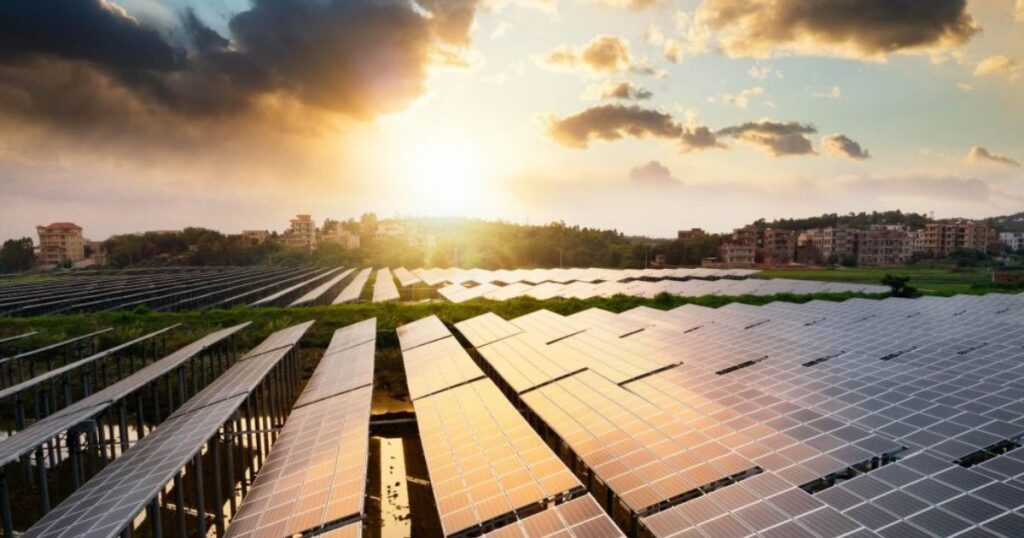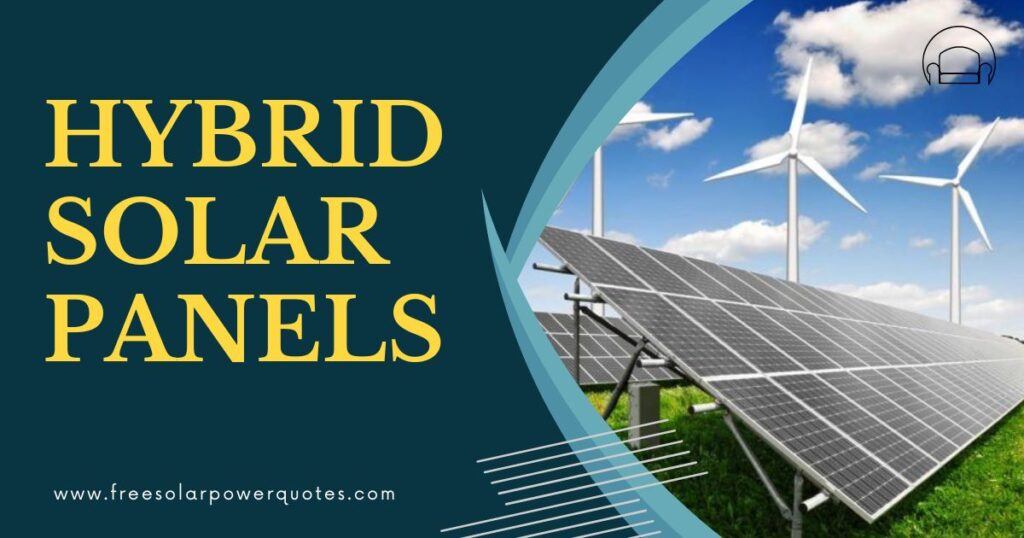Solar energy is becoming an increasingly important renewable energy source worldwide, with millions of households and businesses installing solar panels on their rooftops. Solar panels are an efficient and environmentally friendly way to generate electricity since they can turn sunlight into electricity. However, traditional solar panels have limitations, and researchers have been exploring innovative ways to overcome these limitations. One such innovation is the hybrid solar panel, which combines two different technologies to enhance energy production and efficiency. This article will explore hybrid solar panels, their types, and their benefits.
What are Hybrid Solar Panels?
Hybrid solar panels, also known as hybrid PV panels or solar PVT panels, are a new type of solar panel that combines two different technologies: photovoltaic (PV) and thermal (T). PV panels convert sunlight into electricity, while T panels convert sunlight into thermal energy. By combining both technologies, hybrid solar panels can generate both electricity and heat simultaneously.
Types of Hybrid Solar Panels
There are two types of hybrid solar panels: PV/T panels and PVT panels. PV/T panels are designed to generate electricity and heat simultaneously, while PVT panels prioritize thermal energy and generate electricity as a secondary output.
PV/T panels are the more common type of hybrid solar panel. They are made up of a layer of PV cells on top of a layer of heat-absorbing material. The PV cells absorb sunlight to generate electricity, while the heat-absorbing material captures the remaining heat energy. The heat energy is then transferred to a heat exchanger, which can be used to heat water or provide space heating.
On the other hand, PVT panels prioritize thermal energy and generate electricity as a secondary output. They are made up of a layer of PV cells and a layer of water pipes. The PV cells absorb sunlight to generate electricity, while the water pipes absorb the remaining heat energy. The water can then be used for space heating, domestic hot water, or industrial processes.
Benefits of Hybrid Solar Panels
Hybrid solar panels offer several advantages over traditional solar panels. Some of the benefits are:
- Increased Energy Production: Hybrid solar panels can generate both electricity and heat simultaneously, resulting in increased energy production. PV/T panels can increase the electricity output of a solar panel by up to 20%, while PVT panels can increase the thermal energy output by up to 70%.
- Higher Efficiency: Traditional solar panels can lose up to 20% of the energy they capture due to overheating. Hybrid solar panels reduce the PV cells’ temperature, increasing their efficiency. The heat-absorbing material in PV/T panels and the water pipes in PVT panels help to dissipate the excess heat, resulting in higher efficiency.
- Space Saving: Hybrid solar panels take up less space than traditional solar panels as they combine two technologies into one panel. They are ideal for rooftops with limited area.
- Cost-Effective: Hybrid solar panels can reduce the overall cost of solar energy production. By generating both electricity and heat, they can provide more value per unit of space than traditional solar panels.
- Environmental Benefits: Hybrid solar panels help reduce carbon emissions by generating clean energy. Both methods help reduce the need for fossil fuels and make the world a better place to live.

Applications of Hybrid Solar Panels
Hybrid solar panels have various residential, commercial, and industrial applications. Some of the most common applications are:
- Space Heating: Hybrid solar panels can be used for space heating in residential and commercial buildings. The heat generated by the panels can be used to heat water or provide space heating, which reduces the need for conventional heating systems.
- Hot Water Supply: Hybrid solar panels can provide hot water for residential and commercial buildings. The heat generated by the panels can be used to heat water, which reduces the reliance on conventional water heaters.
- Industrial Processes: Hybrid solar panels can be used for industrial processes that require both electricity and heat, such as food processing or chemical manufacturing. The panels can generate both forms of energy simultaneously, reducing the reliance on traditional energy sources.
- Agriculture: Hybrid solar panels can be used for agricultural purposes, such as heating greenhouses or drying crops. The panels can provide both electricity and heat, reducing the reliance on traditional energy sources and lowering costs.
Challenges of Hybrid Solar Panels
While hybrid solar panels offer many benefits, some challenges are associated with their use.
- Initial Cost: Hybrid solar panels are more expensive than traditional solar panels, and the initial cost of installation can be a barrier for some individuals and businesses.
- Maintenance: Hybrid solar panels require more maintenance than traditional solar panels due to the additional components, such as the heat exchanger or water pipes.
- Weather Conditions: Hybrid solar panels are affected by weather conditions, such as clouds or shade, which can reduce their efficiency. However, they are less affected by temperature changes than traditional solar panels.
Conclusion
Hybrid solar panels are an innovative technology that combines two different technologies to increase energy production and efficiency. They offer several benefits over traditional solar panels, such as increased energy production, higher efficiency, space-saving, cost-effectiveness, and environmental benefits. Hybrid solar panels have various residential, commercial, and industrial applications, such as space heating, hot water supply, industrial processes, and agriculture. Hybrid solar panels are an exciting development in the field of solar energy, despite a few limitations. As more research is conducted and technology advances, we can expect to see even more efficient and cost-effective hybrid solar panels soon.
Looking for a way to save money on your energy bills and help the environment? Get your free solar power quote today by contacting us at freesolarpowerquotes.com! Let’s take the first step towards a brighter, cleaner future.
FAQS
What are hybrid solar panels?
Hybrid solar panels are a type of solar panel system that combines traditional solar photovoltaic panels with additional technologies, such as solar thermal collectors or energy storage systems, to improve energy production and efficiency.
How do hybrid solar panels work?
Hybrid solar panels work by capturing both electricity and heat from the sun. Traditional solar photovoltaic panels convert sunlight into electricity. Other system components, such as solar thermal collectors, absorb heat from the sun and use it to provide hot water or space heating.
What advantages can hybrid solar panels offer?
The benefits of hybrid solar panels include increased energy production, improved efficiency, reduced costs, and increased reliability and resilience. By combining different types of technologies, hybrid systems can produce more energy efficient while providing energy security and backup capabilities.
What are the applications of hybrid solar panels?
Hybrid solar panels can be used in various residential, commercial, and industrial applications. They can be used to provide electricity and heat for homes, businesses, and factories or as part of larger energy systems, such as microgrids.
How much do hybrid solar panels cost?
Hybrid solar panel prices depend on system size, component type, and installation. However, hybrid systems can be more expensive than traditional solar panel systems due to the additional technologies involved.
How much energy can hybrid solar panels produce?
The amount of energy that hybrid solar panels can produce depends on the size of the system, the location, and other factors. However, hybrid systems can generally produce more energy than traditional solar panel systems, as they capture electricity and the sun’s heat.
What is the lifespan of hybrid solar panels?
The lifespan of hybrid solar panels can vary depending on the components used, maintenance, and other factors. However, high-quality components can last for decades, and many hybrid systems come with warranties of 20-25 years or more.
How much maintenance do hybrid solar panels require?
Hybrid solar panels require some maintenance, such as regular cleaning and inspections, to ensure optimal performance. However, they generally require less maintenance than traditional solar panel systems, as they are more efficient and reliable.
Can hybrid solar panels be used off-grid?
Yes, hybrid solar panels can be used off-grid, as they can produce and store energy for use when there is no grid connection. This makes them a popular choice for remote or rural locations and emergency backup power.
How do I know if hybrid solar panels are right for me?
The best way to determine if hybrid solar panels are right for you is to consult with a qualified solar installer or energy consultant. They can evaluate your energy needs, location, and other factors to help you determine if a hybrid system is a right choice for you.

